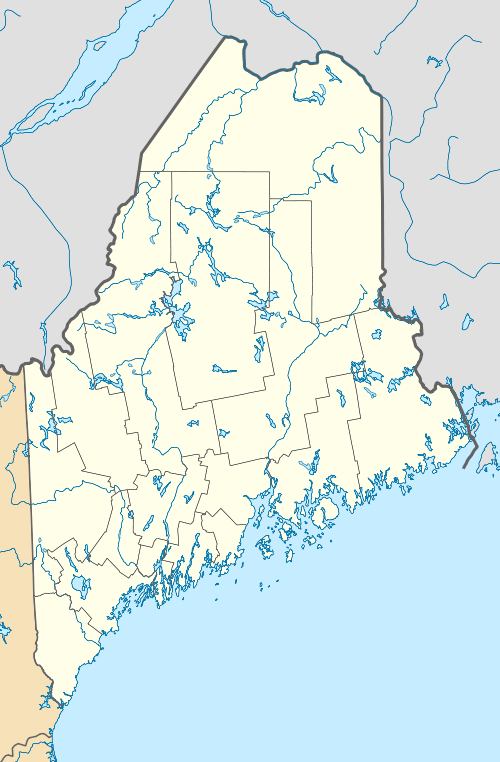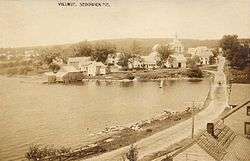Sedgwick, Maine
| Sedgwick, Maine | |
|---|---|
| Town | |
|
View of the village in 1909 | |
 Sedgwick, Maine Location within the state of Maine | |
| Coordinates: 44°19′29″N 68°38′39″W / 44.32472°N 68.64417°W | |
| Country | United States |
| State | Maine |
| County | Hancock |
| Incorporated | 1789 |
| Area[1] | |
| • Total | 31.06 sq mi (80.45 km2) |
| • Land | 26.99 sq mi (69.90 km2) |
| • Water | 4.07 sq mi (10.54 km2) |
| Elevation | 164 ft (50 m) |
| Population (2010)[2] | |
| • Total | 1,196 |
| • Estimate (2012[3]) | 1,190 |
| • Density | 44.3/sq mi (17.1/km2) |
| Time zone | Eastern (EST) (UTC-5) |
| • Summer (DST) | EDT (UTC-4) |
| ZIP code | 04676 |
| Area code(s) | 207 |
| FIPS code | 23-67300 |
| GNIS feature ID | 0582721 |
Sedgwick is a town in Hancock County, Maine, United States. The population was 1,196 at the 2010 census. The town includes the village of Sargentville.
The countryside around Sedgwick is a haven for birdwatchers, as well as an out-of-the-way tourist stop with several bed and breakfast locations.
History
It was one of six contiguous townships, each six miles square, granted by Massachusetts in 1761 to David Marsh and 359 others. Called by its Abenaki name Naskeag, meaning "the end or extremity," its first permanent European settler was Andrew Black in 1759. In 1789, the town was incorporated as Sedgwick, named after Major Robert Sedgwick, who in 1654 captured nearby Fort Pentagouet (now Castine) from the French.
In 1817, land was taken from the township to form Brooksville, with more taken in 1849 to form Brooklin. By 1859, the population was 1,235.[4]
Farmers found the surface broken and ledgy, better suited for grazing than cultivation. Gristmills and sawmills were built along various streams, including the Benjamin River. Because of the geology, for decades Sedgwick had operating many granite quarries, where stone was taken for major public buildings. Most of the quarries have been abandoned. Two companies mined for argentiferous galena, a source of silver. But with two excellent harbors, the town was chiefly occupied by fishing, clam digging, shipbuilding and seafaring. Other businesses included tanning and barrel making.[5]
In March 2011, Sedgwick received attention after passing an ordinance declaring food sovereignty for the town's citizens.[6]
Geography
According to the United States Census Bureau, the town has a total area of 31.06 square miles (80.45 km2), of which 26.99 square miles (69.90 km2) is land and 4.07 square miles (10.54 km2) is water.[1] Drained by the Benjamin River, which separates it from Brooklin, Sedgwick overlooks Penobscot Bay. The Deer Isle Bridge spans the Eggemoggin Reach, connecting Sedgwick to the towns of Deer Isle and Stonington.
The town is crossed by state routes 15, 172, 175 and 176.
Climate
This climatic region is typified by large seasonal temperature differences, with warm to hot (and often humid) summers and cold (sometimes severely cold) winters. According to the Köppen Climate Classification system, Sedgwick has a humid continental climate, abbreviated "Dfb" on climate maps.[7]
Demographics
| Historical population | |||
|---|---|---|---|
| Census | Pop. | %± | |
| 1790 | 569 | — | |
| 1800 | 760 | 33.6% | |
| 1810 | 1,352 | 77.9% | |
| 1820 | 1,420 | 5.0% | |
| 1830 | 1,604 | 13.0% | |
| 1840 | 1,922 | 19.8% | |
| 1850 | 1,235 | −35.7% | |
| 1860 | 1,263 | 2.3% | |
| 1870 | 1,113 | −11.9% | |
| 1880 | 1,128 | 1.3% | |
| 1890 | 1,012 | −10.3% | |
| 1900 | 902 | −10.9% | |
| 1910 | 909 | 0.8% | |
| 1920 | 830 | −8.7% | |
| 1930 | 699 | −15.8% | |
| 1940 | 718 | 2.7% | |
| 1950 | 614 | −14.5% | |
| 1960 | 574 | −6.5% | |
| 1970 | 578 | 0.7% | |
| 1980 | 795 | 37.5% | |
| 1990 | 905 | 13.8% | |
| 2000 | 1,102 | 21.8% | |
| 2010 | 1,196 | 8.5% | |
| Est. 2014 | 1,187 | [8] | −0.8% |
2010 census
As of the census[2] of 2010, there were 1,196 people, 529 households, and 344 families residing in the town. The population density was 44.3 inhabitants per square mile (17.1/km2). There were 800 housing units at an average density of 29.6 per square mile (11.4/km2). The racial makeup of the town was 98.4% White, 0.3% African American, 0.2% Native American, 0.5% Asian, 0.3% from other races, and 0.3% from two or more races. Hispanic or Latino of any race were 1.8% of the population.
There were 529 households of which 26.3% had children under the age of 18 living with them, 50.7% were married couples living together, 9.3% had a female householder with no husband present, 5.1% had a male householder with no wife present, and 35.0% were non-families. 29.3% of all households were made up of individuals and 11.7% had someone living alone who was 65 years of age or older. The average household size was 2.26 and the average family size was 2.73.
The median age in the town was 45.9 years. 20.2% of residents were under the age of 18; 6.7% were between the ages of 18 and 24; 21.4% were from 25 to 44; 32.5% were from 45 to 64; and 19.1% were 65 years of age or older. The gender makeup of the town was 49.6% male and 50.4% female.
2000 census
As of the census[10] of 2000, there were 1,102 people, 470 households, and 307 families residing in the town. The population density was 40.8 people per square mile (15.7/km²). There were 671 housing units at an average density of 24.8 per square mile (9.6/km²). The racial makeup of the town was 96.64% White, 0.18% African American, 0.73% Native American, 0.36% Asian, 0.18% from other races, and 1.91% from two or more races. Hispanic or Latino of any race were 1.09% of the population.
There were 470 households out of which 29.4% had children under the age of 18 living with them, 55.3% were married couples living together, 7.0% had a female householder with no husband present, and 34.5% were non-families. 29.4% of all households were made up of individuals and 13.0% had someone living alone who was 65 years of age or older. The average household size was 2.34 and the average family size was 2.93.
In the town the population was spread out with 25.0% under the age of 18, 6.4% from 18 to 24, 25.2% from 25 to 44, 27.6% from 45 to 64, and 15.9% who were 65 years of age or older. The median age was 40 years. For every 100 females there were 100.7 males. For every 100 females age 18 and over, there were 96.9 males.
The median income for a household in the town was $35,000, and the median income for a family was $40,547. Males had a median income of $26,607 versus $21,944 for females. The per capita income for the town was $19,772. About 6.9% of families were below the poverty line.
Notable people
- Doris Grumbach, novelist, biographer, literary critic and essayist
- Thomas N. Schroth, editor of Congressional Quarterly, founder of The National Journal[11]
- Stan Waterman, Emmy-winning cinematographer and underwater-film producer
- James Russell Wiggins, US representative to the United Nations
References
- 1 2 "US Gazetteer files 2010". United States Census Bureau. Retrieved 2012-12-16.
- 1 2 "American FactFinder". United States Census Bureau. Retrieved 2012-12-16.
- ↑ "Population Estimates". United States Census Bureau. Retrieved 2013-07-06.
- ↑ Coolidge, Austin J.; John B. Mansfield (1859). A History and Description of New England. Boston, Massachusetts. pp. 302–303.
- ↑ Varney, George J. (1886), Gazetteer of the state of Maine. Sedgwick, Boston: Russell
- ↑ Food Nullification by Jesse Walker from Reason
- ↑ Climate Summary for Sedgwick, Maine
- ↑ "Annual Estimates of the Resident Population for Incorporated Places: April 1, 2010 to July 1, 2014". Retrieved June 4, 2015.
- ↑ "Census of Population and Housing". Census.gov. Retrieved June 4, 2015.
- ↑ "American FactFinder". United States Census Bureau. Retrieved 2008-01-31.
- ↑ Weber, Bruce. "Thomas N. Schroth, Influential Washington Editor, Is Dead at 88", The New York Times, August 4, 2009. Accessed August 5, 2009.
External links
- Town of Sedgwick, Maine
- Sedgwick Library Association
- Sargentville Library Association
- Sedgwick-Brooklin Historical Society Museum
- Information about Sedgwick, Hancock County, Maine
Coordinates: 44°18′13″N 68°36′58″W / 44.30361°N 68.61611°W

